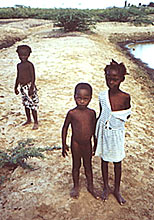USA and France ready to help Haiti, as violence steams up
 USA and France ready to help Haiti, as violence steams up
USA and France ready to help Haiti, as violence steams up

At least 50 have already died in clashes between the police and armed rebels aiming to oust President Jean Bertrand Aristide.
As hundreds of paramilitaries cross the border from neighboring Dominican Republic to join rebel forces, France and the United States speed up financial aid to avoid a certain humanitarian crisis in Haiti. The situation went worse since the beginning of this week, when armed rebels proclaimed a free Republic in their stronghold, the northern city of Gonaives, as president Jean Bertrand Aristide refused once more to resign to his post.
According to the last reports from the Capital, Port-Au-Prince, the US ambassador James Foley, confirmed yesterday his government would deliver $1 million to finance a special mission from the Organization of American States (OAS) to fuel a peace plan conceive by the Caribbean Community (Caricom). “ We ask the opposition to condemn the insurrection and collaborate with the Caricom”, said Foley to the press after wiring funds.
At the same time, French Foreign Minister Dominique de Villepin said France was ready to offer humanitarian assistance to Haiti, but was non-committal about whether France would send a peacekeeping force to the Caribbean nation. Villepin told local reporters he had asked a crisis group to meet at the Foreign Ministry later yesterday to consider what immediate help could be offered to Haiti, where at least 50 people have been killed in the revolt against President Jean-Bertrand Aristide.
"We have the means and many friendly countries are mobilized and ready to act. We have to find a way to do this in liaison with the different Haitian parties," Villepin said. He said France could use its overseas territories of Antilles and Guyana as platforms for its efforts to help Haiti.
In New York, U.N. officials said last week that hundreds of thousands of Haitians could go hungry if the violence continued. And the violence continues, as former soldiers took Haiti's rebellion to the key central city of Hinche, torching the police station and freeing prisoners as President Jean-Bertrand Aristide appealed for international help to end an 11-day-old uprising.
Fearing an exodus, U.N. High Commissioner for Refugees Ron Redmond said the agency was meeting in Washington with U.S. and Caribbean officials to discuss how to cope with any flight of Haitians. UNHCR officials also have met with Cuban authorities, he said.
Rebels now control most roads and have cut off northern Haiti by chasing police from a dozen towns. "Blood has flowed in Hinche," Aristide told reporters late Monday, saying he had asked for technical assistance from the Organization of American States. "It may be that the police cannot cope with this kind of attack."
Tensions exploded into open revolt this month after gunmen who once backed Aristide took control of the city of Gonaives, where Haiti's slaves declared independence from France in 1804. They say Mr. Aristide's party won flawed elections in 2000 and has to resign. At the same time, the legal opposition refuses to take part in a new election unless Mr. Aristide resigns, which he refuses to do before his term ends in 2006.
Haiti has been Latin American poorest country for decades. Last month, Haiti marked 200 years as an independent State from the French Empire. The anniversary sparked the protests against authorities all over the country.
Hernan Etchaleco
Pravda.Ru
Subscribe to Pravda.Ru Telegram channel, Facebook, RSS!


